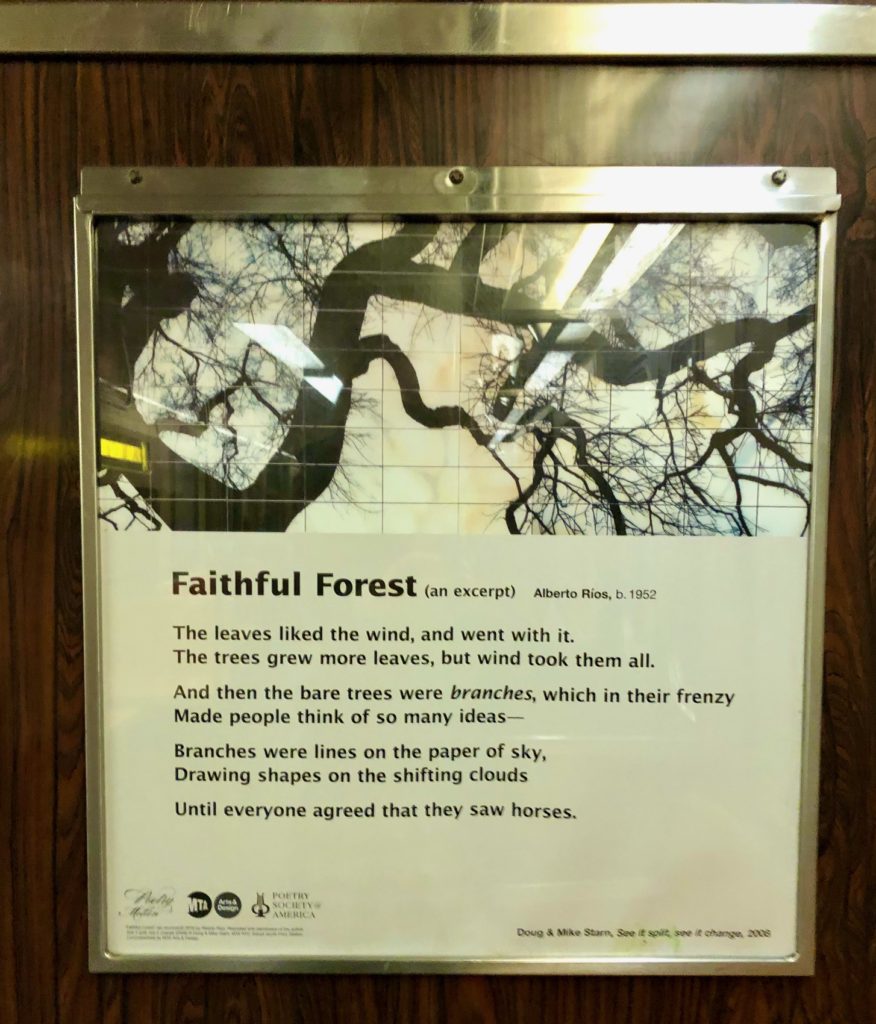
Faithful Forest by Alberto Rios. Seen on the C train in Brooklyn, April 2021.
***

How do you refer to Santa Claus on second reference? Is he Santa or Claus? What about Mrs. Claus?
Join AP’s Twitter chat on Wednesday to discuss this and other important holiday-related language concerns. Details are in AP StyleChat’s tweet below. Continue reading
For Glosso readers regular and new:
Glossophilia wants to draw your attention to its menu, which allows you to choose and read particular categories of post with a simple tap or key-stroke. Whether you’re into glorious gaffes, the differences between Brit-speak and Ameri-speak, the origins of words and phrases, or stories about grammar and language that are making headline news, you can find it all organized and easy to find at Glosso.
Using the menu at the top of the computer screen (as illustrated above) or in the drop-down menu on mobile devices, you can choose to see posts that fall into the following most popular categories:
“Yanks vs Brits”: posts about differences between British English and American English
“In the news”: stories about words, language and language usage that are hitting the headlines
“Glosso’s got the gaffes”: typos, grammatical errors and other amusing language slip-ups that are making us laugh — or cringe
“Top posts”: Posts that have attracted the most readers from around the world (188 countries) over the past 7 years
In the “categories” section to the right of the web screen (and at the bottom of the mobile site) you can see additional categories of Glosso posts*, which filter as follows: Etymology; Fonts & typefaces; Grammar; Jokes and puns; Language; Manners; Names; Nit-picking; Poems, prose & song; Pronunciation; Punctuation; Quizzes; Spelling; and Words, phrases & expressions.
Enjoy your time on the blog, and please feel free to contribute your thoughts, theories or questions and start discussions with fellow glossophiles in the comments section.
***
Please note that most posts fall into more than one category.
Do you ever hear people saying the word intent or exhibit — and think there should surely be an “-ion” on the end of it? “You mean that was your intention rather than your intent?” “Are you talking about a whole exhibition, rather than a single exhibit?” Well this might well happen if you’re an Englishman abroad (i.e. on the other side of the pond), where you’ll hear exhibit and exhibition used interchangeably these days. Intent and intention have also become similarly synonymous Stateside — and I’m not sure if this is also happening over in the UK. Read what distinguishes — or used to distinguish — the “-ion” version of each noun from its “-ion-less” counterpart. Continue reading
“Ring out, wild bells, to the wild sky,
The flying cloud, the frosty light:
The year is dying in the night;
Ring out, wild bells, and let him die.
Ring out the old, ring in the new,
Ring, happy bells, across the snow:
The year is going, let him go;
Ring out the false, ring in the true.
Ring out the grief that saps the mind
For those that here we see no more;
Ring out the feud of rich and poor,
Ring in redress to all mankind.
Ring out a slowly dying cause,
And ancient forms of party strife;
Ring in the nobler modes of life,
With sweeter manners, purer laws.
Ring out the want, the care, the sin,
The faithless coldness of the times;
Ring out, ring out my mournful rhymes
But ring the fuller minstrel in.
Ring out false pride in place and blood,
The civic slander and the spite;
Ring in the love of truth and right,
Ring in the common love of good.
Ring out old shapes of foul disease;
Ring out the narrowing lust of gold;
Ring out the thousand wars of old,
Ring in the thousand years of peace.
Ring in the valiant man and free,
The larger heart, the kindlier hand;
Ring out the darkness of the land,
Ring in the Christ that is to be.”
— Alfred, Lord Tennyson

In Port Morsby, Papua New Guinea, children are seen at Buk bilong Pikinini (Books for Children), an independent not-for-profit organisation that aims to establish children’s libraries and foster a love of reading and learning.
Literacy and access to information have been shown to reduce poverty, providing opportunities for work, increasing household income, even improving the health of children. A child born to a mother who can read is 50% more likely to survive past the age of five.
At a time when literacy and education are under threat from the new U.S. administration, and people are looking to donate to causes that matter to them, Glossophilia offers a selective list of charities devoted to improving literacy and promoting a love of reading. Please feel free to add links to other notable organizations supporting literacy, and please donate what you can to this important global cause. Continue reading
Happy Birthday, Thomas Hardy (2 June 1840 – 11 January 1928). Here are some of his words of wisdom. Continue reading
Yes, we’re separated by a common language — and it’s no different when it comes to the subject of Yuletide yacking: the Brits and the Americans just aren’t on the same page when they’re talking Chrimbo*. Ever find yourself wondering what a mince pie really is? Or what an Englishman is doing when he’s pulling a cracker? What is the name of the fat man who comes down the chimney? And are we meant to be wishing each other a happy or a merry Christmas?
Here’s a Brit-Yank Christmas glossary for your entertainment and amusement. Merry happy Chrimbo, and go pull a cracker! Continue reading